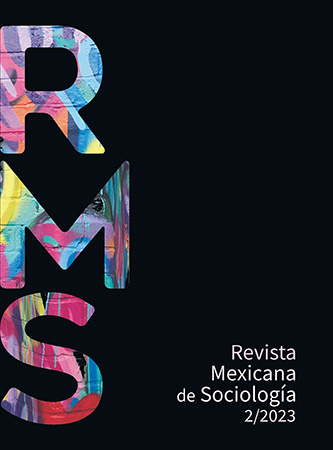Escándalos de corrupción y confianza interpersonal: evidencia de México
Contenido principal del artículo
Resumen
Las consecuencias de los escándalos de corrupción en la confianza interpersonal han sido pasadas por alto. Con series de tiempo de encuestas de los estados mexicanos, este artículo muestra que los escándalos de corrupción dañan la confianza interpersonal. En específico, reducen la confianza en colegas/compañeros de escuela y en amigos. La confianza en vecinos, de por sí baja, no se ve afectada, quizá por un efecto “piso”. La confianza en la familia aumenta, bajo ciertas circunstancias, a raíz de los escándalos de corrupción, posiblemente debido a un efecto de “sustitución”, posterior a la pérdida de confianza en otras relaciones sociales.
Descargas
Detalles del artículo

Revista Mexicana de Sociología por Universidad Nacional Autónoma de México se distribuye bajo una Licencia Creative Commons Atribución-NoComercial-SinDerivar 4.0 Internacional.
Basada en una obra en http://revistamexicanadesociologia.unam.mx/index.php/rms/.
Citas
Anderson, Christopher, y Yuliya Tverdova (2003). “Corruption, political allegiances, and attitudes toward government in contemporary democracies”. American Journal of Political Science 47 (1): 91-109.
Ares, Macarena, y Enrique Hernández (2017). “The corrosive effect of corruption on trust in politicians: Evidence from a natural experiment”. Research & Politics 4 (2): 1-8.
Bågenholm, Andreas (2013). “Throwing the rascals out? The electoral effects of corruption allegations and corruption scandals in Europe, 1981-2011”. Crime, Law, and Social Change 60 (5): 595-609.
Banerjee, Abhijit, Donald P. Green, Jeffery McManus y Rohini Pande (2014). “Are poor voters indifferent to whether elected leaders are criminal or corrupt? A vignette experiment in rural India”. Political Communication 31 (3): 391-407.
Bourdieu, Pierre (1980). “Le capital social: Notes provisoires”. Actes de la Recherche en Sciences Sociales 31 (1): 2-3.
Bowler, Shaun, y Jeffrey Karp (2004). “Politicians, scandals, and trust in government”. Political Behavior 26 (3): 271-287.
Brehm, John, y Wendy Rahn (1997). “Individual-level evidence for the causes and consequences of social capital”. American Journal of Political Science 41 (3): 999-1023.
Canache, Damarys, y Michael Allison (2005). “Perceptions of political corruption in Latin American democracies”. Latin American Politics and Society 47 (3): 91-111.
Chanley, Virginia, Thomas Rudolph y Wendy Rahn (2000). “The origins and consequences of public trust in government: A time series analysis”. Public Opinion Quarterly 64 (3): 239-256.
Chong, Alberto, Ana de la O, Dean Karlan y Leonard Wantchekon (2015). “Does corruption information inspire the fight or quash the hope? A field experiment in Mexico on voter turnout, choice, and party identification”. Journal of Politics 77 (1): 55-71.
Clausen, Blanca, Aart Kraay y Zsolt Nyiri (2009). “Corruption and confidence in public institutions: Evidence from a global survey”. Policy Research Working Paper. World Bank.
Coleman, James (1988). “Social capital in the creation of human capital”. American Journal of Sociology 94: §95-§120.
Di Tella, Rafael, e Ignacio Franceschelli (2011). “Government advertising and media coverage of corruption scandals”. American Economic Journal 3 (4): 119-151.
Evans, Peter (1996). “Government action, social capital and development: Reviewing the evidence on synergy”. World Development 24 (6): 1119-1132.
Ferraz, Claudio, y Federico Finan (2008). “Exposing corrupt politicians: The effects of Brazil’s publicly released audits on electoral outcomes”. Quarterly Journal of Economics 123 (2): 703-745.
Ferraz, Claudio, y Federico Finan (2011). “Electoral accountability and corruption: Evidence from the audits of local governments”. American Economic Review 101 (4): 1274-1311.
Fukuyama, Francis (1995). Trust: The Social Virtues and the Creation of Prosperity. Nueva York: Free Press.
Guiso, Luigi, Paola Sapienza y Luigi Zingales (2004). “The role of social capital in financial development”. American Economic Review 94 (3): 526-556.
Gutiérrez, Nicolás, Ray Hilborn y Omar Defeo (2011). “Leadership, social capital and incentives promote successful fisheries”. Nature 470 (7334): 386.
Instituto Nacional de Estadística y Geografía (INEGI) (2018). Encuesta Nacional de Victimización y Percepción sobre Seguridad Pública (Envipe). México: INEGI.
Keele, Luke (2007). “Social capital and the dynamics of trust in government”. American Journal of Political Science 51 (2): 241-254.
Knack, Stephen, y Philip Keefer (1997). “Does social capital have an economic payoff? A cross-country investigation”. Quarterly Journal of Economics 112 (4): 1251-1288.
Morris, Stephen, y Joseph Klesner (2010). “Corruption and trust: Theoretical considerations and evidence from Mexico”. Comparative Political Studies 43 (10): 1258-1285.
Paxton, Pamela (2002). “Social capital and democracy: An interdependent relationship”. American Sociological Review 67 (2): 254-277.
Peters, John, y Susan Welch (1980). “The effects of charges of corruption on voting behavior in congressional elections”. American Political Science Review 74 (3): 697-708.
Petersen, German (2018). “Elites and turnovers in authoritarian enclaves: Evidence from Mexico”. Latin American Politics and Society 60 (2): 23-40.
Petersen, German (2021). “Early democratization, corruption scandals and perceptions of corruption: Evidence from Mexico”. Democratization 28 (2): 333-352.
Petersen, German (2022). “Todos fuera: el efecto antisistema de los escándalos de corrupción”. Política y Gobierno 29 (2).
Pretty, Jules (2003). “Social capital and the collective management of resources”. Science 302 (5652): 1912-1914.
Przeworski, Adam, Michael E. Alvarez, José Antonio Cheibub y Fernando Limongi (2000). Democracy and Development: Political Institutions and Well-Being in the World, 1950-1990. Nueva York: Cambridge University Press.
Putnam, Robert (1994). Making Democracy Work: Civic Traditions in Modern Italy. Jersey: Princeton University Press.
Putnam, Robert (2000). Bowling Alone: The Collapse and Revival of American Community. Nueva York: Simon & Schuster.
Richey, Sean (2010). “The impact of corruption on social trust”. American Politics Research 38 (4): 676-690.
Rothstein, Bo, y Eric Uslaner (2005). “All for all: Equality, corruption, and social trust”. World Politics 58 (1): 41-72.
Rothstein, Bo, y Dietlind Stolle (2008). “The state and social capital: An institutional theory of generalized trust”. Comparative Politics 40 (4): 441-459.
Seligson, Mitchell (2002). “The impact of corruption on regime legitimacy: A comparative study of four Latin American countries”. Journal of Politics 64 (2): 408-433.
Seligson, Mitchell (2006). “The measurement and impact of corruption victimization: Survey evidence from Latin America”. World Development 34 (2): 381-404.
Solé-Ollé, Albert, y Pilar Sorribas-Navarro (2018). “Trust no more? On the lasting effects of corruption scandals”. European Journal of Political Economy 55: 185-203.
Uslaner, Eric (2002). The Moral Foundations of Trust. Nueva York: Cambridge University Press.
Whiteley, Paul (2000). “Economic growth and social capital”. Political Studies 48 (3): 443-466.


